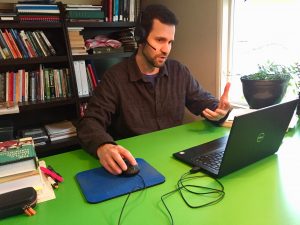 Through the combined efforts of The College of Arts & Sciences and Maxwell, eight new courses will be available in University College’s signature eight-week online format this summer. These courses include weekly, live synchronous sessions that connect students with the instructor and peers to form a community of learning within each course. The unique course structure allows students to engage in asynchronous learning modules, assignments and assessments between live sessions, allowing them to balance home, work and academic schedules. The expansion of these online offerings allows students more options for meeting the liberal studies core requirements and program electives. These new courses will launch in the Summer 8-week II session which begins July 6, 2020.
Through the combined efforts of The College of Arts & Sciences and Maxwell, eight new courses will be available in University College’s signature eight-week online format this summer. These courses include weekly, live synchronous sessions that connect students with the instructor and peers to form a community of learning within each course. The unique course structure allows students to engage in asynchronous learning modules, assignments and assessments between live sessions, allowing them to balance home, work and academic schedules. The expansion of these online offerings allows students more options for meeting the liberal studies core requirements and program electives. These new courses will launch in the Summer 8-week II session which begins July 6, 2020.
They are: MAT 121, Probability and Statistics for the Liberal Arts I; ANT 185, Global Encounters; HTW 12, Personal and Social Health; ECN 101, Intro to Microeconomics; HST 111, Early Modern Europe; GEO 372, Political Geography; PSC 363, Ethics and International Relations and SWK 328, Human Diversity in Social Contexts.

 The Center for Online & Digital Learning
The Center for Online & Digital Learning The Office of Online Student Success
The Office of Online Student Success